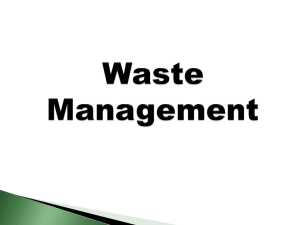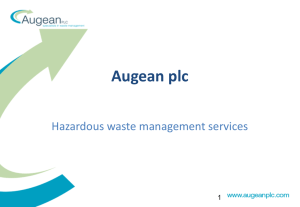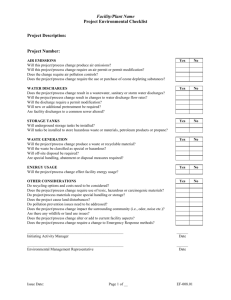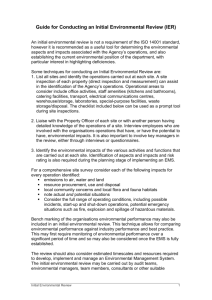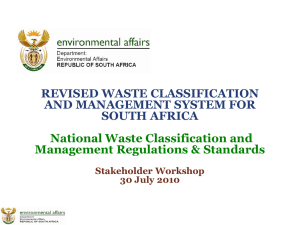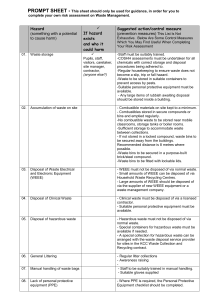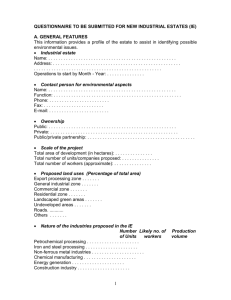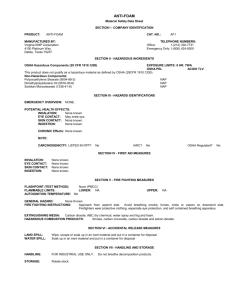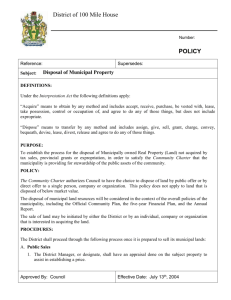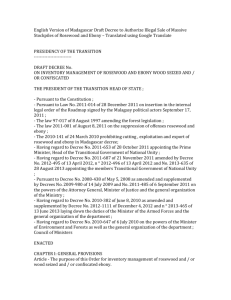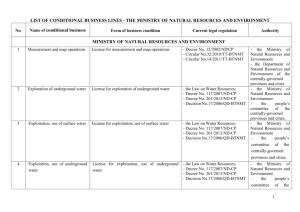UNDP/Kenya – Legislative Frameworks for Solid Waste
advertisement
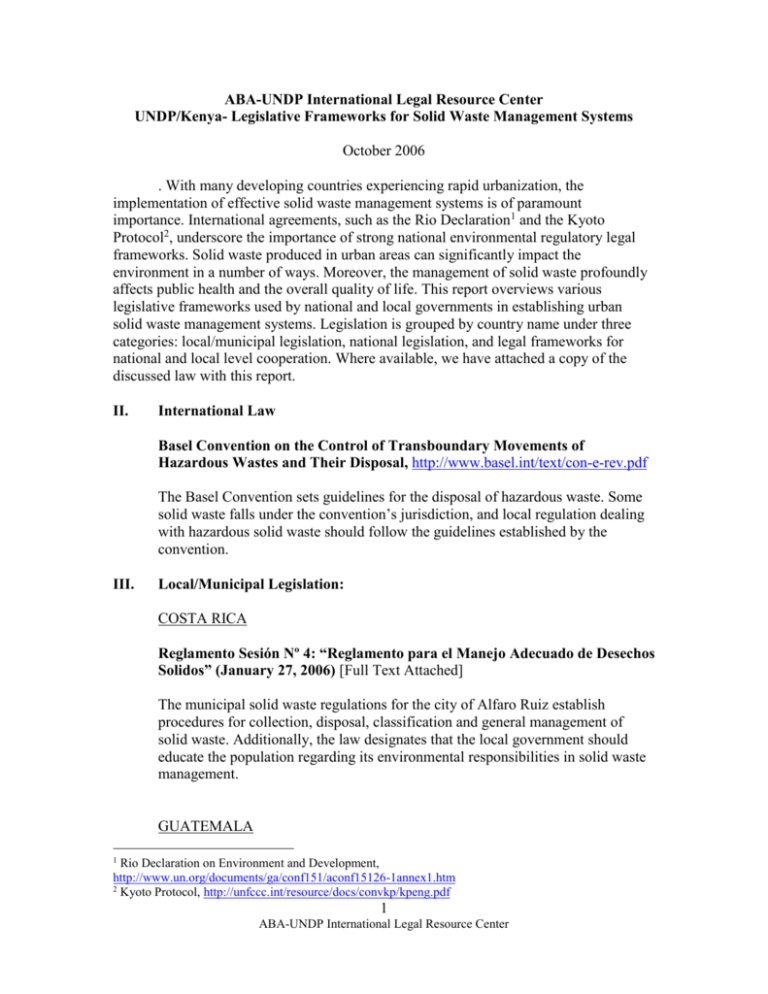
ABA-UNDP International Legal Resource Center UNDP/Kenya- Legislative Frameworks for Solid Waste Management Systems October 2006 . With many developing countries experiencing rapid urbanization, the implementation of effective solid waste management systems is of paramount importance. International agreements, such as the Rio Declaration1 and the Kyoto Protocol2, underscore the importance of strong national environmental regulatory legal frameworks. Solid waste produced in urban areas can significantly impact the environment in a number of ways. Moreover, the management of solid waste profoundly affects public health and the overall quality of life. This report overviews various legislative frameworks used by national and local governments in establishing urban solid waste management systems. Legislation is grouped by country name under three categories: local/municipal legislation, national legislation, and legal frameworks for national and local level cooperation. Where available, we have attached a copy of the discussed law with this report. II. International Law Basel Convention on the Control of Transboundary Movements of Hazardous Wastes and Their Disposal, http://www.basel.int/text/con-e-rev.pdf The Basel Convention sets guidelines for the disposal of hazardous waste. Some solid waste falls under the convention’s jurisdiction, and local regulation dealing with hazardous solid waste should follow the guidelines established by the convention. III. Local/Municipal Legislation: COSTA RICA Reglamento Sesión Nº 4: “Reglamento para el Manejo Adecuado de Desechos Solidos” (January 27, 2006) [Full Text Attached] The municipal solid waste regulations for the city of Alfaro Ruiz establish procedures for collection, disposal, classification and general management of solid waste. Additionally, the law designates that the local government should educate the population regarding its environmental responsibilities in solid waste management. GUATEMALA 1 Rio Declaration on Environment and Development, http://www.un.org/documents/ga/conf151/aconf15126-1annex1.htm 2 Kyoto Protocol, http://unfccc.int/resource/docs/convkp/kpeng.pdf 1 ABA-UNDP International Legal Resource Center Accord 028-2002 (September 26, 2002): “Reglamento de Manejo de Desechos Solidos para El Municipio de Guatemala” [Full Text Attached] Establishing the legal regulatory framework for the management of solid waste for the Municipality of Guatemala, Accord 028-2002 establishes guidelines for storage, cleaning, recollection, recycling, and the disposal of waste. IV. National Legislation: ANGOLA Executive Decree 20/90 (January 22, 1999)3 This law set forth the organizational structure and procedure of the Direccao Nacional de Quadros (National Directorate of Personnel) within the “Ministerio da Administracao do Territorio (Ministry of Administration of the Territory). This has relevance to the issue of solid waste management, as the law established that the National Directorate would oversee the selection and training involving personnel at the local level in the area of recycling and environmental management. BRAZIL Provisional Measure 80 (February 13, 1995) and Provisional Measure 937 (March 15, 1995) [Full Text Attached] These laws both establish rules and procedures regarding the contracting of public services. Included among these services are basic sanitation, trash treatment, and other services related to the management of solid waste. EL SALVADOR Decree 739 (June 28, 1996): “Declárase de interés público a las empresas privadas que se dediquen al procesamiento de desechos solidos” [Full Text Attached] This law encourages the private companies to become involved with solid waste management through articulating that the formation of private companies focusing on solid waste disposal is in the public interest. The law also grants these companies some exemptions to custom duties. HONDURAS 3 The summary of the decree is based upon information obtained on the Global Legal Information Network (http://www.glin.gov). Further information regarding the decree can be found through the GLIN network. 2 ABA-UNDP International Legal Resource Center Decree 85-98 (April 27, 1998) [Full Text Attached] The law establishes the Fondo de Desarollo para Projectos de Generación con Recursos Renovables y Sostenibles and encourages investment in the development of renewable resources, among which can come from urban solid waste. In consequence, this law establishes a research institution related to the disposal of solid waste. MEXICO General Law for the Prevention and Integral Management of Wastes (May 22, 2005), http://www.sma.df.gob.mx/rsolidos/03/federal/01clave.pdf Focusing on hazardous wastes, the law establishes a framework for classifying hazardous waste and selecting sites for their disposal. The law also outlines preventative measures to safeguard against hazardous waste affecting public safety. RUSSIA Federal Law “On Environmental Protection” (December 10, 2002)4 This law establishes the legal framework for environmental management and protection. Articulated in the law include provisions for environmental research and monitoring of environmental protections. Chapter II specifically deals with environmental management, including that of waste disposal. Chapter III pertains to the economic management of environmental policies. V. Legislation Frameworks for National-Local Partnerships in Solid Waste Management: CZECH REPUBLIC Act No. 185/2001Coll.: Waste and Amendments to Some Other Acts (2001) According to Act No. 185/2001 Coll., on Waste and Amendments to Some Other Acts5 (2001), local authorities are responsible for municipal waste management. 6 4 For further information regarding the decree, see the Global Legal Information Network (http://www.glin.gov) 5 2001-06 Waste Generation, Recovery and Disposal in the Czech Republic, http://www.czso.cz/eng/edicniplan.nsf/o/2001-06-in_2005-metodicke_vysvetlivky 6 Sanitation Country Profile: Czech Republic, www.un.org/esa/agenda21/natlinfo/countr/czech/Czechsanitation04f.pdf 3 ABA-UNDP International Legal Resource Center However, local authorities must follow regulations established by the Ministry of the Environment.7 The Ministry of the Environment, in coordination with the National Institute of Public Health and the Czech Environmental Institute, sets forth policies regarding the proper handling of solid waste. EGYPT Law Number 4 of 1994 Promulgating the Environmental Law and its Executive Regulation [Full Text Attached] The law establishes the legal framework for Egypt’s Ministry of the Environment and the regulation of environmental policies. The Ministry has regulatory authority and works with local agents in implementing and enforcing environmental initiatives. One such recent initiative in the field of solid waste management was the National Strategy for Municipal Solid Waste.8 The strategy, developed by the national government, coordinated with local governments in increasing the capacity and effectiveness in disposing of solid waste. Fostering such intergovernmental relationships is useful in combining resources to improve solid waste management. SOUTH AFRICA No. 107 of 1998 National Environmental Management Act (November 27, 1998) [Full Text Attached] The act established the National Environmental Advisory Forum as an advisory council to the Minister of the Environment and Tourism. The object of this body is to advise the creation and implementation of environmental initiatives. The act also created the Committee for Environmental Co-Ordination, outlining procedures for such initiatives to be implemented at the national and local levels. The framework clarifies responsibilities for environmental management—relevant to the management of solid waste. TUNISIA Loi No. 97-40 (June 9, 1997) [Full Text Attached] This decree regulates the disposal of plastic and metal objects. Recycling of such objects is encouraged, and the law requires enterprises authorized to conduct recycling of plastic or metal- based products by the Ministry of Environment to submit an annual report of their activities to the National Agency of Environment Protection. While local mayors are primarily responsible for waste control, the 7 Ministry of the Environment, http://www.env.cz/AIS/web-en.nsf/ Egyptian Environmental Affairs Agency, “Solid Waste Management,” http://www.eeaa.gov.eg/english/main/accomp4.asp 8 4 ABA-UNDP International Legal Resource Center National Agency of Environment Protection is responsible for the enforcement of the Waste Control Act. 5 ABA-UNDP International Legal Resource Center
